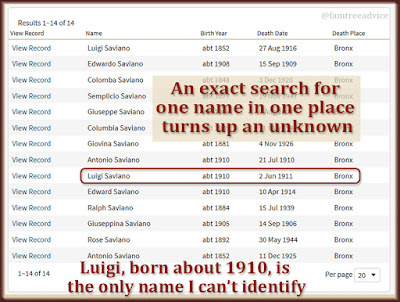How much more can you learn by researching one family name at a time?
There's an organization called the Guild of One-Name Studies based in London. Its members study one last name and its variations over time and geography. Maybe that's more interesting for some cultures than others. I looked for my Italian surnames—even the most common one I have—and found none.
That's why I'd rather do my own version of a one-name study. Here's why I think you should do the same.
You Can Connect With Your DNA Matches
Earlier this month I wrote about the benefits of focusing on one genealogy goal at a time. Concentrating on one goal shuts out all the noise and distractions. If you stick to the goal, you'll get better results.
One of my 2019 genealogy goals is to "enter every Pozzuto baby from Colle Sannita into my family tree". I have tons of vital records from my grandfather's town of Colle Sannita on my computer. I'm going through them year by year, stopping each time I find a birth record for a baby with the last name Pozzuto. Then I enter that baby into my family tree.
 |
| Labelling my files lets me search for any name. Adding the xxxxx's show me who isn't in my family tree yet. |
Keeping my focus on one name builds more families faster. And the more Pozzuto families I build, the easier it is to figure out my relationship to my Pozzuto DNA matches.
As I focus on Pozzuto, I keep thinking about which name I want to do next. Should I do my own last name of Iamarino? Whichever name I choose, I'm going to make a ton of progress.
You Can Find Forgotten Relatives
I searched Ancestry.com for every person named Saviano who died in the Bronx, New York. It was a very specific search for the exact name and the exact place. Saviano is the maiden name of my great grandmother. Her father was my first ancestor to leave Italy and come to America. He settled his family in the Bronx.
 |
| Restrict your searches to one last name, not one person, for more discoveries. |
There were 14 people listed with deaths ranging from 1906–1947. Of the 14, one was news to me. Luigi Saviano was one year old when he died in 1911. And I don't know who he is. Who were his parents?
I have two 2nd great uncles named Saviano who had children in the Bronx. Neither one could have been Luigi's father because:
- he had another baby at about that time, and
- I have close cousins who know about every member of those families.
I also have two 3rd great uncles named Saviano. Their sons might have been Luigi's father, but I don't know enough about them. Did they come to New York? This gives me a new set of Saviano relatives I need to research.
Searching for distant Saviano relatives may uncover cousins my living relatives never knew.
You Can Better Understand Your Roots
I have a PDF of a book on Italian last name origins. It's perfect for anyone with Italian roots. (You can download it from archive.org.) Here's part of what it says for my last name:
Iamarino is absolutely rare and seems to originate from Colle Sannita (Benevento, Italy)…it could derive from a combination of the names Gianni and Marino).…In Colle Sannita, Iamarino has been registered since 1588 as a last name belonging to several local families.
Woo hoo! I'm authentic Colle Sannita.
The book says my name of Saviano is rare, too. And for my name Pilla, it says:
It seems to derive from the medieval name Pilla, present in the area between Benevento and Foggia, but absolutely not used elsewhere. Based on registers of the church in Colle Sannita (Benevento, Italy) the name Pilla is one of the oldest in the area. It has been registered there since 1588, and is still present.
Rock on, Pilla.
You can search for your name origin for free on Google Books. Go to books.google.com and enter a search term (last names, German names, Irish names, etc.). Then restrict your results to only "Free Google eBooks". I found:
- Patronymica Britannica, a dictionary of the family names of the United Kingdom (This covers more nationalities than you'd think.)
- The Book of English Surnames: Being a Short Essay on Their Origin and Signification
- The Origin and Signification of Scottish Surnames
- A Dictionary of Names, Nicknames, and Surnames of Persons, Places and Things
- The Teutonic Name-system Applied to the Family Names of France, England and Germany
Be sure to search archive.org, too. That's where my Italian last name book came from.
What can you learn about the last names of your ancestors? The history behind your many family names may surprise you.









